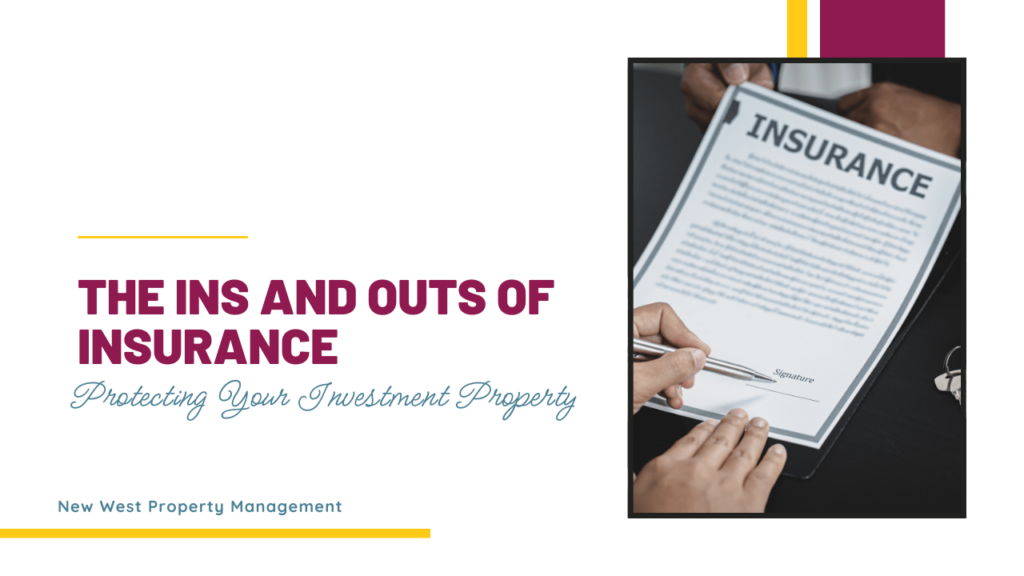
You may find yourself confused and uncertain about the insurance that you need for your Las Vegas investment property. Does your homeowner’s insurance cover the investment if it’s a home you once lived in yourself? How much liability is necessary? How do you know you’re choosing the right policy for you and your investments?
We’re going to try to answer all of those questions today by providing a look at the ins and outs of insurance.
A good insurance policy is the starting point when we talk about risk management and protecting your investment. It’s essential that you understand exactly what’s covered and that you buy enough insurance to protect you during a major loss.
Landlord Insurance vs. Homeowner Insurance
Property insurance for landlords, also known as landlord insurance, is a specialized type of insurance policy designed to protect rental properties. Unlike standard homeowner’s insurance, which covers owner-occupied properties, landlord insurance is tailored to address the unique risks associated with renting out property to tenants.
It will cover your structure and any of your own possessions inside the property (such as appliances), but it will not cover the contents that belong to your residents. This is why renter’s insurance is also so important when we’re talking about protecting rental properties, but we’ll discuss that more in detail a little bit later. First, let’s look at the benefits of having property insurance for your Las Vegas rental:
- Property Damage Protection
Your insurance policy will cover damages to the building or the structure that’s caused by faulty structural issues, some natural disasters, fire, vandalism, and other perils. Ideally, you’ll have an insurance policy that will cover the rebuilding or the replacement of all or part of your property.
- Liability Coverage
Just as important as the property damage protection is the liability coverage. Your insurance policy will protect you in case a tenant or visitor gets injured on your property and you are found legally responsible. Liability coverage amounts are higher with a landlord policy than they are with a homeowner’s policy.
- Loss of Rental Income:
Most, but not all, insurance policies for landlords have a loss of income coverage. This compensates you for lost rental income if your property becomes uninhabitable due to a covered event. If your existing policy does not include this, make sure you add it. Making repairs and replacements is expensive, but not having rental income while that work is being done can be devastating. You want to make sure your income is not disrupted.
- Legal Expense Coverage:
The legal help in your insurance policy will be helpful if you find yourself having to evict a tenant or defend yourself in court against a claim that they make against you. Make sure you choose an insurance policy that protects you legally as well as financially.
Types of Coverage You Should Consider
Here’s what you want to make sure you’re considering when you talk to an insurance agent and choose a policy to cover your Las Vegas investment.
- Building or Structural Insurance
Whether you’re renting out a small apartment complex, units in a larger community, or a single-family home, you have to think about your property as a building, or a structure. And you’ll need insurance that will cover its rebuilding or replacement if something terrible happens. Building insurance covers the structure of your property, including the walls, roof, and floors. This ensures that damages from events like fire, storm damage, or burst pipes are covered, enabling you to repair and rebuild without significant financial strain. The amount of coverage you’ll need depends on a number of factors, including the age and condition of your property and its value.
- Contents Insurance
While the bulk of your property’s contents may belong to your tenants, it’s still essential to have contents insurance for items you provide within that property. Most often, this coverage applies to the appliances that are inside your property. Your washer and dryer, for example, or the refrigerator may need to be replaced, and the contents coverage will be the reason you can file a claim. Contents insurance protects these items from damage or theft.
- Liability Insurance
As we mentioned earlier, liability insurance is crucial for landlords. If a tenant or visitor is injured on your property and decides to sue, liability insurance can cover medical expenses and legal fees, protecting you from potentially devastating financial loss.
- Loss of Income Insurance
If your property is uninhabitable due to damage from a covered event, loss of income insurance can cover the rental income you would have otherwise received. This can be a lifesaver in maintaining cash flow during repairs.
- Renter’s Insurance
Requiring renter’s insurance from your tenant is a good idea and in their own best interests. Your tenant’s belongings and possessions are not covered by your own policy. So, they’ll need a renter’s insurance policy in order to protect what they own and keep in the home, whether we’re talking about musical instruments or electronics or art or furniture. This type of insurance is often fairly inexpensive for tenants, and easy to get. Write this requirement into your lease agreement and ask for proof of insurance before you allow them to move in.
Choosing the Right Insurance Policy
Working with a good insurance agent is a great way to choose the right insurance policy. If you don’t already have an agent, talk to us and we can make a referral. As you talk through the different options with your agent, here are the things you’ll want to ponder as you choose the right policy for you and your investments:
- Assess Your Property’s Risk
Before selecting an insurance policy, it’s essential to assess the specific risks associated with your Las Vegas investment property. Consider factors such as location, property age, and any unique features that may influence the level of coverage required. You likely won’t have to worry about hurricanes, obviously, but you might have some concerns around the damage that extreme heat can cause. Which perils are most likely to threaten your investment? Knowing this can help you plan accordingly while buying insurance.
- Compare Quotes
Insurance premiums can vary significantly between providers, so it’s wise to compare quotes from multiple insurers. Look for a policy that offers comprehensive coverage at a competitive price, ensuring that you’re getting the best value for your money. Insurance policies have grown more expensive over the last few years. According to the Nevada Independent, those costs have risen by more than 20 percent since 2018. Budget accordingly.
- Read the Fine Print
You have to know what’s covered and what’s excluded. Insurance policies can be complex, with various exclusions and limitations. Take the time to read the fine print and understand exactly what is and isn’t covered. Don’t hesitate to ask your insurance agent for clarification on any terms or conditions that may be unclear.
- Consider Bundling Policies
Many insurance providers offer discounts for bundling multiple policies together. If you have other insurance needs, such as auto or life insurance, consider consolidating them with a single provider to take advantage of potential savings. This can make sense if you’re willing to have diverse policies with the same carrier.
Tips for Negotiating Coverage
 Before entering negotiations, it’s crucial to have a clear understanding of your property’s value. Conduct a thorough appraisal to determine the property’s worth, including the value of structures, land, and any improvements. This will empower you to negotiate coverage amounts that adequately protect your investment.
Before entering negotiations, it’s crucial to have a clear understanding of your property’s value. Conduct a thorough appraisal to determine the property’s worth, including the value of structures, land, and any improvements. This will empower you to negotiate coverage amounts that adequately protect your investment.
You also want to be informed about your coverage options. Familiarize yourself with the different types of coverages available, ranging from basic to comprehensive packages. Knowing your options will allow you to negotiate a policy that aligns with your specific needs and budget. Consider speaking with multiple insurance agents to gain a broader perspective on what each coverage entails.
Insurance companies often offer a variety of discounts, such as for installing security systems, bundling policies, or even for having a long history of no claims. Ask your agent about any available discounts and see how they can help reduce your premium without compromising on coverage.
One strategy for lowering your insurance premium is to opt for a higher deductible. While this means you’ll pay more out-of-pocket in the event of a claim, it can significantly reduce your annual premium. Ensure you have enough savings to cover the deductible if necessary.
Finally, review and adjust as necessary. Insurance needs can change over time, so it’s important to review your coverage periodically. Evaluate your policy annually and after any significant changes to your property, such as renovations or upgrades. Regular reviews can help you negotiate better terms and ensure your policy stays relevant to your needs. Your property is likely increasing in value. It’s important that your coverage keeps up.
We aren’t insurance agents, but we are professional Las Vegas property managers, and we help owners and investors work through insurance questions and claims all the time. If you’d like more information, please contact us. Our team at New West Property Management expertly manages residential rental homes in Las Vegas and throughout Clark County, including Henderson and North Las Vegas.
